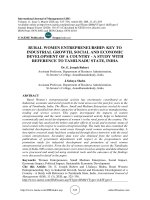Economic growth and economic development 517
Bạn đang xem bản rút gọn của tài liệu. Xem và tải ngay bản đầy đủ của tài liệu tại đây (105.07 KB, 1 trang )
Introduction to Modern Economic Growth
Exercise 10.6. Modify the Ben Porath model studied in Section 10.3 as follows.
First, assume that the horizon is finite. Second, suppose that φ0 (0) < ∞. Finally,
suppose that limx→h(0) φ0 (x) > 0. Show that under these conditions the optimal
path of human capital accumulation will involve an interval of full-time schooling
with s (t) = 1, followed by another interval of on-the-job investment s (t) ∈ (0, 1),
and finally an interval of no human capital investment, s (t) = 0. How do the
earnings of the individual evolve over the life cycle?
Exercise 10.7. Prove that as long as Y (t) = F (K (t) , H (t)) satisfies Assumptions
1 and 2, the inequality in (10.29) holds.
Exercise 10.8. Show that equilibrium dynamics in Section 10.5 remain unchanged
if δ < 1.
Exercise 10.9. Prove that the current-value Hamiltonian in (10.23) is jointly concave in (k (t) , h (t) , ik (t) , ih (t)).
Exercise 10.10. Prove that (10.24) implies the existence of a relationship between
physical and human capital of the form h = ξ (k), where ξ (·) is uniquely defined,
strictly increasing and continuously differentiable.
Exercise 10.11. Prove 10.1. Show that the differential equation for consumption
growth could have alternatively been written as
1
c˙ (t)
=
[fh (k (t) , ξ (k (t))) − δh − ρ] .
c (t)
εu (c (t))
Exercise 10.12. Consider the neoclassical growth model with physical and human
capital discussed in Section 10.4.
(1) Specify the consumer maximization problem in this economy.
(2) Define a competitive equilibrium (specifying firm optimization and market
clearing conditions).
(3) Characterize the competitive equilibrium and show that it coincides with
the solution to the optimal growth problem.
Exercise 10.13. Introduce labor-augmenting technological progress at the rate g
into the neoclassical growth model with physical and human capital discussed in
Section 10.4.
(1) Define a competitive equilibrium.
503









